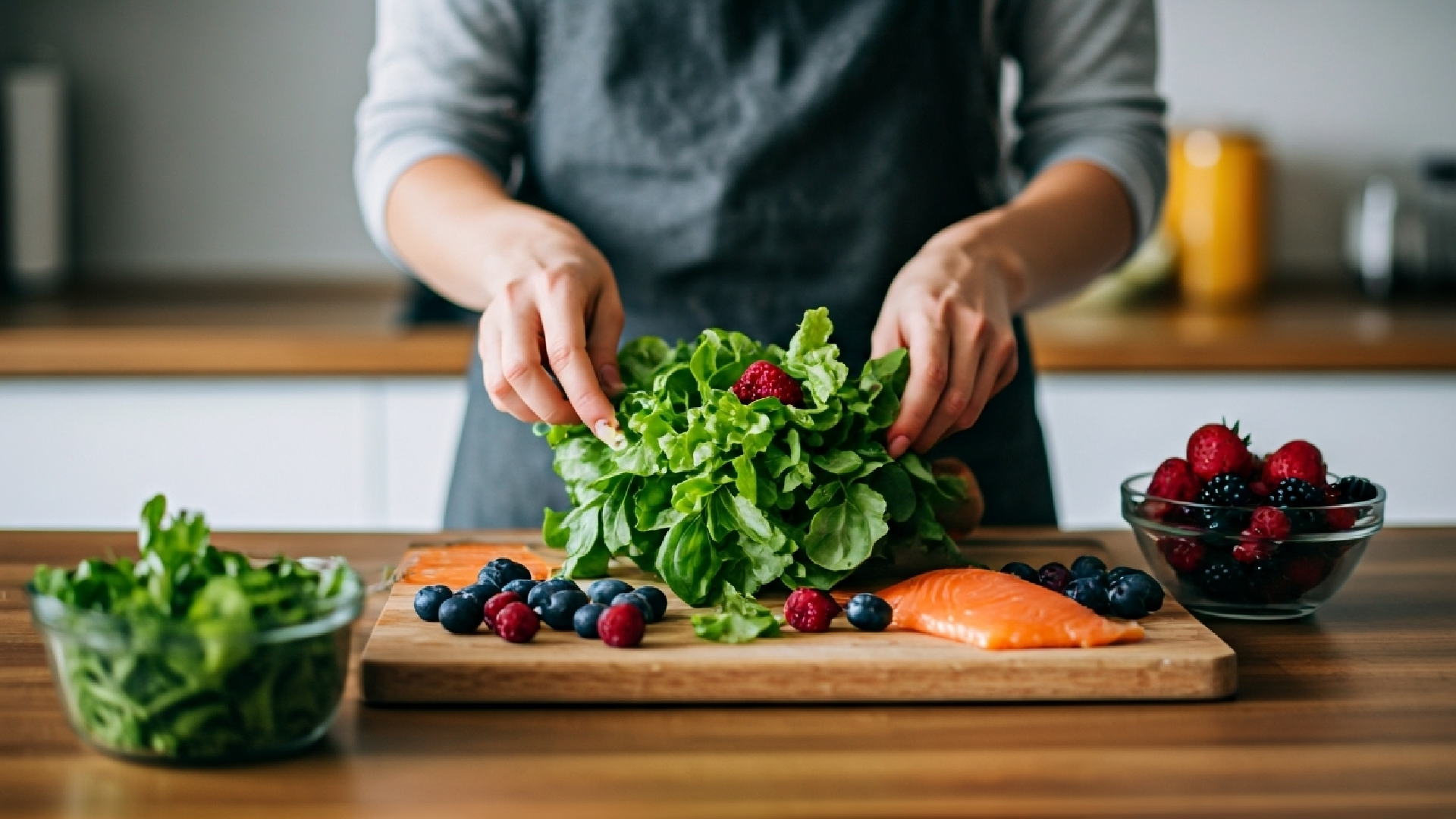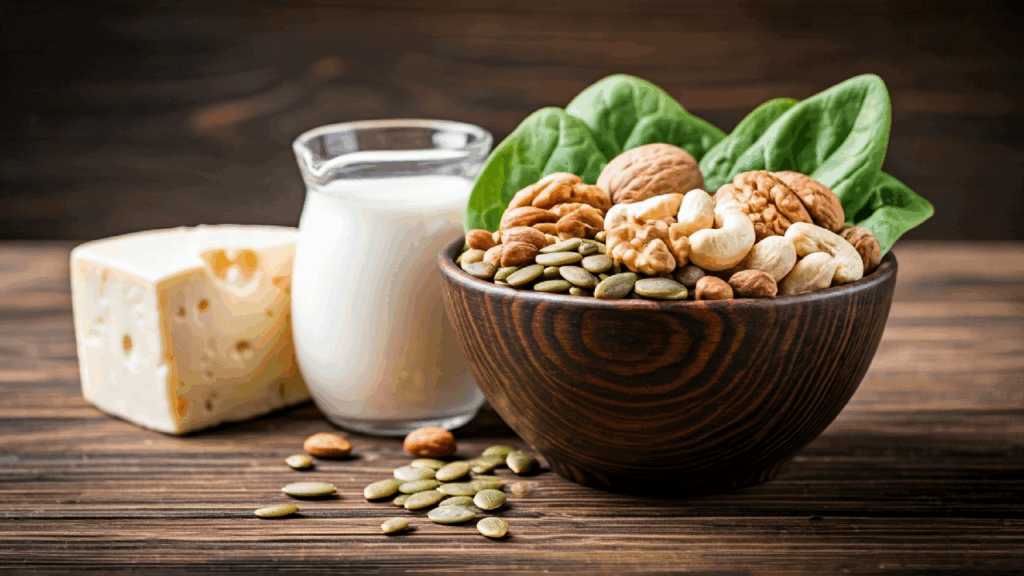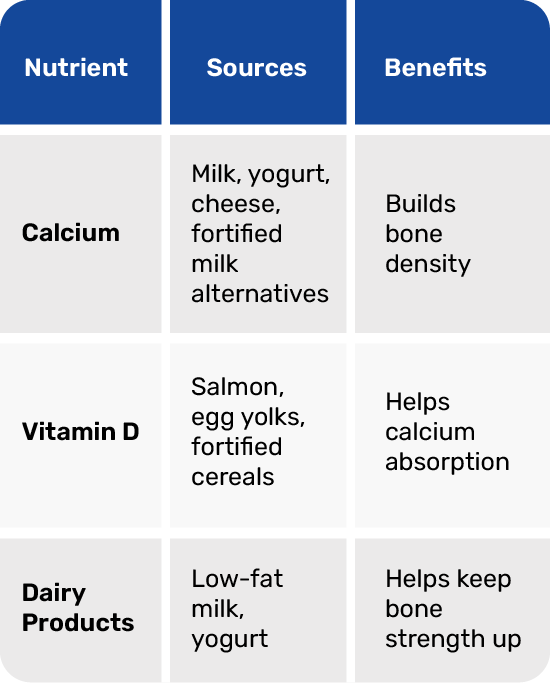

Discover how certain foods can alleviate knee pain by reducing inflammation and supporting joint health.
Discover how your diet affects your immune system and arthritis symptoms, and learn how to achieve better knee pain relief.
Discover which anti-inflammatory foods, such as fatty fish, leafy greens, and whole grains, can help reduce joint swelling and encourage more physical activity.
Understand how eating harmful foods, like processed snacks and unhealthy fats, makes swelling worse and makes it hard to move your joints.
Learn why nutrients like vitamin D, calcium, and antioxidants are essential to make your knee joints stronger.
Get answers to common questions about handling knee pain with a healthy diet.
Knee pain can get in the way of your daily life. It often makes it hard to do simple things. Arthritis, an injury, or excessive weight can cause this pain. To manage knee pain, it is not enough to simply use medication. It is also important to have a healthy diet. Eating right can help support your joint health and reduce swelling in the knee. It also provides long-term relief from knee pain.
When you eat the right foods, you support your body’s immune system. This can help alleviate knee pain for a long time. Eating well will also help your overall health and improve your quality of life. A proper diet does not just make your knees stronger. It also allows the rest of your body to feel good and last longer.
What you eat can affect your knee joints. A healthy diet helps maintain steady levels of inflammation. This supports your body and helps to lower symptoms of arthritis. Eating foods rich in omega-3 fatty acids and antioxidants can help with knee pain. They fight joint swelling and may make you feel better.
But eating too many unhealthy fats or a lot of sugar can make joint pain worse over time. To feel better and keep your body strong, it’s beneficial to choose more whole foods. Whole foods help lower joint pain by keeping inflammation low. They give your knees the support they need. Eating this way is one of the best ways to support your joints and reduce joint inflammation and swelling.
Inflammation plays a crucial role in managing knee pain. But it is not always bad. The body needs it. The immune system kicks in when there is an injury or when something bothers a joint. This kind of response protects you and helps heal the area. Still, when there is excessive inflammation or it persists, you may experience joint swelling, pain, and tenderness that lasts for a prolonged period.
People with knee pain due to arthritis often experience higher levels of inflammation. With rheumatoid arthritis, the immune system attacks the joints. With osteoarthritis, people experience pain and swelling due to the thinning or tearing of the cartilage in the knee. Both types can lead to increased joint swelling and exacerbate joint pain. These problems raise inflammation levels, which causes stiffness and trouble moving.
Sometimes, inflammation persists even when people eat poorly, especially if they consume a high amount of processed foods or unhealthy oils. This can exacerbate joint pain. To reduce joint swelling, people should limit their exposure to triggers and increase their intake of foods that help combat inflammation. This helps alleviate joint pain in people with arthritis and knee pain in others as well. Now, let’s talk about the ways that different nutrients can make joints stronger and relieve knee pain.
Your joints need a variety of foods because they provide the nutrients you need. Foods rich in amino acids, antioxidants, and vitamins help strengthen your tissues. Amino acids found in bone broth help repair broken cartilage. Antioxidants help fight free radicals, which can hurt the cells in your body.
Vitamin C is found in fruits and leafy greens. This vitamin helps your body produce collagen, which is essential for maintaining healthy, strong joints that can move freely. The health benefits you get are not just for your knees. Eating these foods helps you stay active and maintain a healthy body.
Eating fruits that are bright in color, vegetables of all kinds, and whole grains provides your body with many nutrients. Each of these helps keep your joints working as they should and keeps them safe from damage. Now, let’s look at some key anti-inflammatory foods that support joint health even more.

From fatty fish to colorful leafy greens, anti-inflammatory foods act like natural helpers for knee pain. Healthy fats in salmon and olive oil help to keep your joints safe from swelling. These foods also support your heart health. Whole foods, such as leafy greens and nuts, can block the substances that cause joint swelling.
When you focus on eating foods rich in nutrients, it helps improve your joint health. You do not have to give up your overall wellness to feel this difference. If you incorporate these foods into your daily meals, you may experience reduced knee pain. These habits also provide a long-term approach to staying active, making physical activity easier. Eating this way helps you maintain a healthy weight and reduces joint swelling in your daily life.
Fatty fish are a great source of omega-3 fatty acids. These fats help alleviate knee pain by reducing joint swelling. They do this by lowering specific proteins in the body, such as C-reactive protein and interleukin-6, that can cause inflammation and swelling.
Eating fatty fish, such as salmon, mackerel, and sardines, can help alleviate knee pain. These fish are suitable for your heart health, too. Experts recommend that people eat about 3 to 6 ounces of fish at least four times a week. This helps keep your joints strong and supports a healthy diet.
To keep your joints feeling better in the long term, consider incorporating fatty fish into your meals. It’s a great way to get health benefits for both your body and your heart.
Fruits and leafy greens are full of antioxidants and polyphenolic compounds. These help lower inflammation and protect your joints. Berries, such as blueberries and strawberries, contain flavonoids like quercetin. These work well to fight joint swelling.
Green, leafy vegetables, such as kale and spinach, and cruciferous vegetables, including cabbage and Brussels sprouts, contain enzymes that help prevent joint damage associated with arthritis. These greens also give you vitamin C and dietary fiber, which are very important.
You can add these foods to your smoothies, salads, or stir-fries for a delicious and nutritious addition. Doing so can be a good way to enhance your meals and help alleviate knee pain.
Certain nutrients can help your knee joints stay strong. Calcium and vitamin D are good for your bones. These help your knees stay strong every day. Antioxidants protect cartilage cells from free radicals, which can cause swelling and joint pain.
You can get these nutrients from dairy products, green tea, and fruits. Eating more of these foods can help alleviate knee pain. When you make healthy food choices, you support your joint health and overall mobility. Eating well helps your body feel good and can keep joint pain away for a long time.
Calcium and vitamin D are both important for strong bones and can help protect against fractures. You can get more of these by drinking fortified orange juice, eating dairy products, or adding leafy vegetables rich in calcium to your meals. This can help your bones stay strong.
Here’s a text table with more details about where you can find these nutrients: (TABLEE…)


People with arthritis often have low levels of vitamin D and calcium. This is why incorporating dairy products, vitamin D-rich foods, leafy vegetables, and fortified orange juice into your daily diet can provide your joints with better support. Include these in your meals for optimal bone health.
Antioxidants help to protect your joints from swelling and pain. These small parts help protect against free radicals, which can exacerbate knee problems. Vitamin C plays a significant role in this regard. You can find it in foods like citrus fruits, peppers, and leafy greens.
Green tea is a great way to support your body’s needs. It contains polyphenolic compounds that lower inflammation levels throughout the body. With green tea, your body can heal more effectively because it helps maintain a steady immune system.
For better joints:
Antioxidants, along with physical therapy, give extra strength to your knee joints and help you get well in a simple, natural way.
Some foods can be detrimental to your joint health because they increase inflammation levels. Processed foods, red meats, and foods high in added sugars can exacerbate knee pain and joint stiffness. White bread and white rice are two examples. They lack fiber, making them unsuitable for your overall health.
These foods increase inflammation levels, which in turn affect your immune system’s ability to function correctly. If you avoid unhealthy fats and refined carbs, you help your body better manage knee pain and arthritis. Your knees will function more effectively, and you will support long-term mobility and joint health.
Processed foods and those with added sugars can exacerbate knee pain. Eating refined foods, such as white bread and white rice, can lead to increased inflammation. This also makes the immune system less effective.
If you eat whole grains and fresh fruits or vegetables instead, you can help maintain your body’s balance. This also helps reduce inflammation levels and is beneficial for the immune system.
Red meat and foods that have a lot of saturated fats can make joint pain worse. When you eat fatty beef or pork, your body produces more chemicals that can hurt your knee joints.
If you opt for lean poultry or plant-based fats instead, it can be beneficial for your heart and overall health. The best way to help alleviate knee and joint pain is to incorporate these foods into your diet, along with anti-inflammatory foods. This can also help keep your whole body healthier.
To summarize, there is a clear connection between what you eat and knee pain relief. Understanding how inflammation affects knee pain and incorporating anti-inflammatory foods, such as fatty fish, fruits, and leafy greens, can help improve your joint health. It is also essential to obtain sufficient calcium and vitamin D for strong bones. At the same time, avoiding processed foods and red meat can help reduce pain.
Changing your food habits in this way does more than just alleviate your knee pain. It can also improve your overall well-being. These steps empower you to manage your knee health effectively. Discover how food, including vitamin D, red meat, leafy greens, and fatty fish, can help alleviate knee pain with a free consultation from our experts.
Yes, some foods can help ease the symptoms of arthritis. Fatty fish, leafy vegetables, and berries are good for knee pain. They work by helping control swelling in the body. Clinical trials have shown that consuming more plants can improve joint health more effectively than an unhealthy diet. All of this can help alleviate knee pain.
Yes. Processed foods, red meat, and unhealthy fats increase inflammation levels. This can make joint pain worse. Foods with a lot of added sugar, such as desserts, and refined carbs, like white bread, cause the same problem. If you eat less of these foods, your joints can be healthier.
Making changes to your diet can help alleviate knee pain over time. Eating meals rich in nutrients and engaging in regular physical activity can help strengthen your immune system and relieve joint discomfort. When you stick with these changes, you build good habits that last. This can provide you with better knee pain relief and also improve your overall quality of life.
Eating a plant-based diet rich in leafy vegetables and whole grains is beneficial for your joint health. These foods have antioxidants that help lower inflammation levels in the body. This reduces the risk of arthritis in the long run. Eating these foods can also help you stay active and move better each day. You will notice significant improvements in how your joints feel and function.
Fish oil supplements and calcium can help alleviate knee pain for some individuals. However, their effectiveness varies from person to person. Eating these foods often provides more benefits. Some clinical trials have shown that targeted supplements may also help a person. Always consult your doctor before adding any new supplements. This is important for your overall health.

Pioneering Interventional Pain Management
Delhi | Faridabad | Gurugram | Ghaziabad | Noida | Lucknow | Jaipur | Mumbai
© 2025 Nivaan. All Rights. Reserved